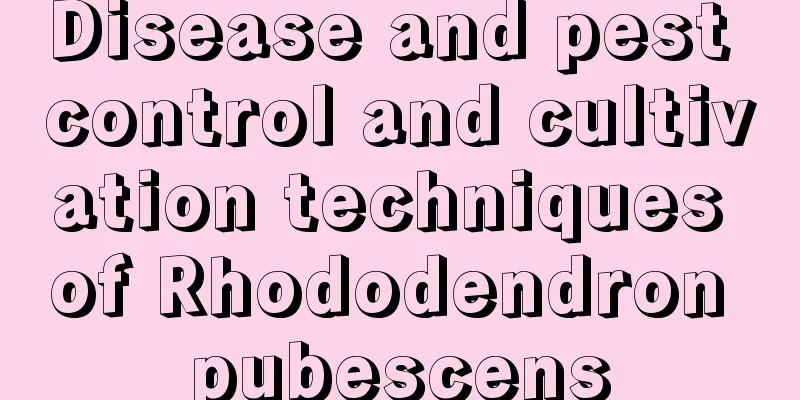Disease and pest control and cultivation techniques of Rhododendron pubescens

|
The hairy azalea, also known as the splendid azalea , has rich colors, beautiful flower shapes, profuse flowering, and strong adaptability. It is one of the mainstream varieties of cultivated azalea in China today. So what are its specific cultivation techniques ? How to prevent and control diseases and pests? Let’s learn more about it below. Cultivation technology of Mao Juan 1. Planting Select mature and healthy seeds, place them in moist growing medium or vermiculite, and lightly cover with a layer of fine soil. Make sure the culture medium remains moist and at a moderate temperature. The germination time and success rate of seeds will vary, generally taking from several weeks to several months. Once the seedlings have developed a pair of true leaves, they can be transplanted into individual culture containers. 2. Cuttings Select healthy plants and cut healthy branches from their tops or side branches. Cut these branches into small sections of moderate length, retaining 2 to 3 leaves in each section, remove the bottom leaves, and retain 2 to 3 cm of stem. Insert these cuttings into moist growing medium or vermiculite, making sure the stems are covered with soil and the growing medium is kept moist. Place the grafted branches in an environment with suitable temperature for cultivation. When the cuttings have new leaves and show signs of healthy growth and development, they can be transplanted into new culture containers. Disease and Pest Control of Rhododendron 1. Brown spot disease Small brown or black spots appear on the leaves, gradually expanding to form patches. In severe cases, the leaves turn yellow and fall off. In the early stage of the disease, Bordeaux mixture or carbendazim can be sprayed for prevention and control. 2. Root rot The roots turn black and rot, the plant grows weak, and the leaves turn yellow. For prevention and control, the infected plants should be dug out immediately, the diseased roots should be cut off, and they should be replanted in disinfected soil, and the roots should be irrigated with a solution of carbendazim or carbendazim. 3. Red spider Yellow or white spots appear on the leaves. In severe cases, the leaves turn grayish white, affecting photosynthesis. Abamectin, cypermethrin and other pesticides can be used for spray control. 4. Aphids It mainly occurs on the back of leaves and tender shoots, causing the leaves to turn yellow and curl. Control methods include washing the infested areas with water, hanging yellow sticky insect boards, and spraying with imidacloprid. In general, although Rhododendron alopecuroides is popular as an ornamental flower , there are still some challenges and problems in its cultivation and maintenance techniques. The key is to pay attention to good planting methods and disease and pest control, which are important means to maintain the health of Rhododendron.
|
<<: The most complete water-soluble fertilizer formula ratio
>>: The correct way to repot a fortune tree
Recommend
How many years does the crab apple tree bear fruit?
Introduction to Planting Crab Apple Trees The san...
Can raw eggs be used to water Clivia?
1. Can I Of course you can. The effect of using r...
How to grow magnolia potted plants
Magnolia potted plant maintenance When caring for...
Can cherry branches survive by grafting?
1. Can it be inserted alive? If you want to make ...
Bodhi tree cultivation methods and precautions
The Bodhi tree is relatively easy to grow and is ...
What are the cultivation methods and precautions of ivy?
Ivy cultivation method Ivy likes warm, humid, sem...
Cultivation methods and precautions of Foxtail Asparagus (Cultivation knowledge of Foxtail Asparagus)
Foxtail Asparagus is a perennial herbaceous everg...
How to sow Periploca
1. Prepare seeds Wait until the fruits are ripe i...
What to do if Tangyin leaves fall off
The reason why Tangyin leaves fall off Suffering ...
Winter Management in the City That Never Sleeps
Winter in the City That Never Sleeps: Light and T...
How to grow succulents in red pottery pots
Key Points If we want to grow succulents in terra...
How many years does a cherry tree bear fruit?
1. Results of several years Under normal circumst...
Reasons and solutions for lilac not blooming
Lilac comes in a variety of colors, including pur...
What is the reason for the yellowing of the tips of the leaves of hydroponic green radish?
1. Failure to change water in time Reason: Becaus...
When is Wuchang rice harvested?
Wuchang rice is a specialty rice of China. It is ...









